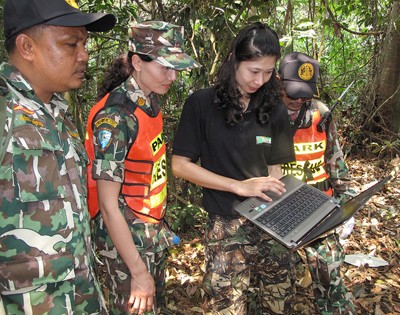
Illegal trade represents one of the largest threats to biodiversity in Asia. At current rates of illegal wildlife trade (including fisheries) up to 40 percent of Asian wildlife species could be lost in this century. Wildlife trafficking is the fourth largest black market in the world, with an estimated annual value of $20 billion. Overfishing and destructive fishing practices are driving Asian fisheries to the brink, and negatively impact marine and coastal resources that sustain more than 120 million people living in the region. Unsustainable wildlife trade also degrades the health of ecosystems, human health, governance structures and economies. As Asia develops and regional connectivity increases, so does the need for protection of the region’s globally important natural resources. In response to these threats, USAID oversees two flagship regional biodiversity programs, Asia’s Regional Response to Endangered Species Trafficking and the Oceans and Fisheries Partnership.
Asia’s Regional Response to Endangered Species Trafficking:
USAID ARREST addresses illegal wildlife trafficking through strengthening regional institutions and networks by developing and replicating best practices to reduce illegal trade. The program supports seven regional environmental platforms to protect biodiversity and combat illegal wildlife trafficking. Through project support, these platforms adopted and implemented 16 regional agreements, strategies, plans and protocols that combat wildlife crime. The five-year program is designed to reduce public demand for illegal products, raise awareness about endangered species, and increase wildlife trafficking arrests and seizures by training more than 8,500 government officials in effective law enforcement techniques. USAID ARREST is also strengthening cooperation between the 10 nations that make up the Association of Southeast Asian Nations (ASEAN) through development of a Wildlife Enforcement Network (ASEAN-WEN) that has been replicated in other parts of Asia and Africa as a model for addressing transnational wildlife crime.
The Oceans and Fisheries Partnership (USAID Oceans):
The Oceans and Fisheries Partnership between USAID, the Southeast Asian Fisheries Development Center and the Coral Triangle for Coral Reefs, Fisheries and Food Security works to strengthen regional cooperation to combat illegal, unreported and unregulated fishing, promote sustainable fisheries and conserve marine biodiversity in the Asia-Pacific region. Southeast Asia houses some of the world's most productive and biodiverse marine ecosystems. These ecosystems provide food and income to over 200 million people in the region; however, unsustainable fishing practices threaten biodiversity, food security and livelihoods. USAID Oceans supports the development of a transparent and financially sustainable catch documentation and traceability system to help ensure that fisheries resources are legally caught and properly labeled.
Complementing these programs, USAID also builds the science capacity of female scientists engaged in biodiversity research by investing in the global Partnerships for Enhanced Engagement in Research scholarship project.







Comment
Make a general inquiry or suggest an improvement.